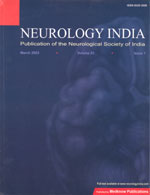
|
Neurology India
Medknow Publications on behalf of the Neurological Society of India
ISSN: 0028-3886 EISSN: 1998-4022
Vol. 52, Num. 2, 2004, pp. 273-274
|
Neurology India, Vol. 52, No. 2, April-June, 2004, pp. 273-274
Letter To Editor
Nadroparin in acute ischemic stroke
Kumar Sudhir
Department of Neurological Sciences, Christian Medical College Hospital, Vellore - 632004
Correspondence Address:Department of Neurological Sciences, Christian Medical College Hospital, Vellore - 632004
sk@cmcvellore.ac.in
Code Number: ni04091
Sir,
I read with interest the recent article by Sarma GRK et al.[1] Based on a randomized controlled trial, they conclude that the outcome of stroke is significantly better in the group receiving nadroparin and aspirin versus the group receiving aspirin alone. However, I would like to make certain comments.
Firstly, data regarding the incidence of recurrent or progressive infarction during the follow-up period has not been provided. It is well known that both aspirin and heparin are mainly useful in preventing either re-infarction or progressive infarction. Moreover, in previous studies, a similar reduction in the rate of re-infarction or progressive infarction was seen with low molecular weight heparin (LMWH) and aspirin.[2] Therefore, anticoagulation with LMWH, in order to prevent new infarction or worsening of neurological status, is not recommended in the early management of stroke.[3]
The second issue is regarding the risk of hemorrhagic complications. Sarma GRK et al noted upper gastrointestinal bleeding in one patient (5%) in the LMWH group (requiring withdrawal of nadroparin) as compared to none in the aspirin group. Other investigators too have observed a significantly higher risk of bleeding with LMWH as compared to aspirin.[4]
Thirdly, Sarma GRK et al draw an analogy between nadroparin and recombinant tissue plasminogen activator (rtPA) and advocate an early initiation of the former. However, it should be noted that rtPA is the only proven therapy for restoring or improving cerebral perfusion till date and nadroparin does not have this ability.[3] Therefore, it may be inappropriate to draw any comparisons between the two, as their roles in treatment of acute stroke are entirely different.
Finally, there are a few limitations as mentioned by Sarma GRK et al, such as small sample size (only 20 in each arm) and lack of follow-up beyond three months, which further limit the usefulness of this trial. Moreover, studies with a larger sample size (> 1000 patients)[5] and longer follow-up (six months)[6] have failed to demonstrate any significant benefit with LMWH over aspirin.
In conclusion, data provided in this study is inconclusive and does not instill enough confidence to make a change in the current practice of avoiding combination of LMWH and aspirin in the treatment of acute ischemic stroke.
References
| 1. | Sarma GR, Roy AK. Nadroparin plus aspirin versus aspirin alone in the treatment of acute ischemic stroke. Neurol India 2003;51:208-10. Back to cited text no. 1 [PUBMED] [FULLTEXT] |
| 2. | Berge E, Abdelnoor M, Nakstad PH, Sandset PM. Low molecular-weight heparin versus aspirin in patients with acute ischaemic stroke and atrial fibrillation: A double-blind randomised study. HAEST Study Group. Heparin in Acute Embolic Stroke Trial. Lancet 2000;355:1205-10. Back to cited text no. 2 [PUBMED] [FULLTEXT] |
| 3. | Adams HP Jr, Adams RJ, Brott T, del Zoppo GJ, Furlan A, Goldstein LB, et al. Guidelines for the early management of patients with ischemic stroke: A scientific statement from the Stroke Council of the American Stroke Association. Stroke 2003;34:1056-83. Back to cited text no. 3 [PUBMED] [FULLTEXT] |
| 4. | Diener HC, Ringelstein EB, von Kummer R, Langohr HD, Bewermeyer H, Landgraf H et al. Treatment of acute ischemic stroke with the low-molecular-weight heparin certoparin: Results of the TOPAS trial. Therapy of Patients With Acute Stroke (TOPAS) Investigators. Stroke 2001;32:22-9. Back to cited text no. 4 [PUBMED] [FULLTEXT] |
| 5. | The Publications Committee for the Trial of ORG 10172 in Acute Stroke Treatment (TOAST) Investigators. Low molecular weight heparinoid, ORG 10172 (danaparoid) and outcome after acute ischemic stroke: A randomized controlled trial. JAMA 1998;279:1265-72. Back to cited text no. 5 [PUBMED] [FULLTEXT] |
| 6. | Kay R, Wong KS, Yu YL, Chan YW, Tsoi TH, Ahuja AT, et al. Low-molecular-weight heparin for the treatment of acute ischemic stroke. N Engl J Med 1995;333:1588-93. Back to cited text no. 6 [PUBMED] [FULLTEXT] |
Copyright 2004 - Neurology India
|
